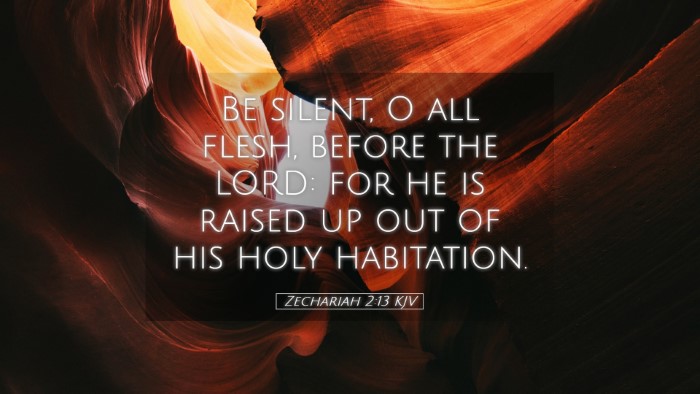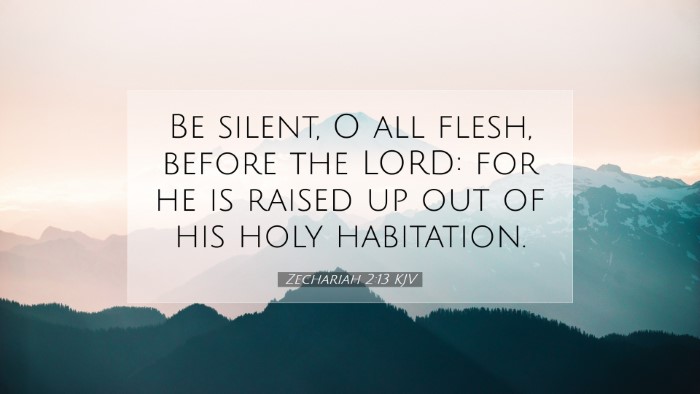Old Testament
Genesis Exodus Leviticus Numbers Deuteronomy Joshua Judges Ruth 1 Samuel 2 Samuel 1 Kings 2 Kings 1 Chronicles 2 Chronicles Ezra Nehemiah Esther Job Psalms Proverbs Ecclesiastes Song of Solomon Isaiah Jeremiah Lamentations Ezekiel Daniel Hosea Joel Amos Obadiah Jonah Micah Nahum Habakkuk Zephaniah Haggai Zechariah MalachiZechariah 2:13
Zechariah 2:13 KJV
Be silent, O all flesh, before the LORD: for he is raised up out of his holy habitation.
Zechariah 2:13 Bible Commentary
Commentary on Zechariah 2:13
Zechariah 2:13 states: "Be silent, O all flesh, before the LORD: for he is raised up out of his holy habitation." This brief yet profound verse captures a moment of reverence and awe before the divine presence of God. In the exploration of this passage, we can draw rich insights from various public domain commentaries including those of Matthew Henry, Albert Barnes, and Adam Clarke.
Contextual Background
The book of Zechariah is interestingly situated within the post-exilic period of Judean history. The prophet Zechariah delivered a series of visions and oracles aimed at encouraging the Jewish people as they returned to Jerusalem to rebuild the temple after their Babylonian captivity.
The Call for Silence
The phrase “Be silent, O all flesh” serves as a powerful exhortation to humans in the presence of God. This silence suggests a profound recognition of God’s sovereignty and holiness. Here, commentators provide enlightening interpretations:
- Matthew Henry: Henry posits that this call to silence is an acknowledgment of human insignificance in contrast to the omnipotence of God. It underscores the importance of humility before God, urging believers to quiet their hearts and minds to hear His voice.
- Albert Barnes: Barnes elaborates that this silence is indicative of a moment when all creation ought to stand still in awe of God’s actions. He mentions that such silence reflects the seriousness of God’s impending intervention in the affairs of men.
- Adam Clarke: Clarke interprets “all flesh” as a reference to all humanity, emphasizing the idea that both the physical and spiritual realms must submit to God’s authority. For Clarke, this submission is vital for understanding the divine will and purpose.
Divine Presence and Holiness
The latter portion of the verse, “for he is raised up out of his holy habitation,” affirms God's active involvement in the world. Insights from commentators further illuminate this notion:
- Matthew Henry: He notes that God’s “holy habitation” refers to His heavenly throne, from where He governs the universe. The act of God being “raised up” symbolizes His readiness to act on behalf of His people, instilling hope amidst adversity.
- Albert Barnes: Barnes emphasizes the transcendence of God, highlighting that His holy habitation signifies His separateness from sin and His unapproachable light. This juxtaposition of divine majesty and the call for reverence reflects an important theological principle: God's holiness must lead to human humility.
- Adam Clarke: Clarke suggests that this raising up signifies God’s response to the prayers and needs of His people. He interprets this as God's decisive action to aid repentance and restoration, aligning God’s holiness with His compassionate nature.
Theological Implications
This verse raises several theological implications that are relevant for pastors, scholars, and theologians today:
- The Sovereignty of God: The passage serves to remind us of God’s overarching control over human affairs. Recognizing God’s sovereignty leads to a deeper faith and trust in His plans.
- The Importance of Reverence: The call for silence illustrates the need for reverence in worship. A genuine worship experience must begin with an acknowledgment of God’s holiness and our need for humility.
- God's Immanence and Transcendence: Despite His exalted position, God’s readiness to “raise up” and actively engage with His creation demonstrates His desire for relationship and restoration.
Practical Application
For believers today, the practical applications of Zechariah 2:13 are profound:
- Quiet Reflection: In a fast-paced world, the call to silence prompts us to intentionally set aside time for reflection and prayer, fostering a deeper communion with God.
- Worship Practices: Churches can enhance their worship practices by incorporating moments of silence, allowing congregations to prepare their hearts to receive and respond to God’s presence.
- Encouragement in Trials: Just as the original audience received encouragement, believers today can find hope in the assurance that God is present and active in their struggles.
Conclusion
Zechariah 2:13 encapsulates a moment of divine encounter that calls for silence and reflection in the presence of God. With insights from notable commentators, it is clear that this admonition serves not merely as a historical note but as a timeless reminder of God’s sovereignty, holiness, and desire for intimacy with His creation. As believers meditate on this verse, they are encouraged to approach God with reverence, waiting in silence for His guidance and intervention.


